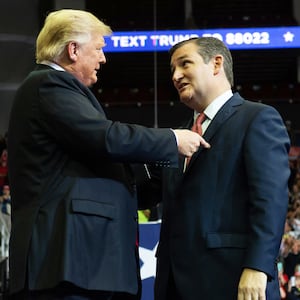In recent months, President Trump has insisted that a “red wave” is coming this November and that Republicans would hold onto, and even expand, their majorities in the House and the Senate.
But as the election has gotten closer, the president’s outlook has increasingly soured, and that optimism he once exhibited from the campaign trail has been replaced by tangible fear over what a Democratic House next year might mean to his administration and inner circle.
“He’s definitely more spooked than he was before,” a senior West Wing official told The Daily Beast. “Several of us are expecting to spend more time [testifying] on the Hill soon.”
ADVERTISEMENT
In public, Trump world is still arguing that Republicans will hold on to control of the House, with the president triumphantly tweeting taunts at the media for failing to acknowledge just how big an impact he is having in motivating voters.
“He thinks it’s going to be close… We’ve all believed it’s going to be close,” Rudy Giuliani, the former New York City mayor, told The Daily Beast on Tuesday. Giuliani serves as a lead Trump attorney for the Russia probe, but he has also advised Trump on political matters. Trump, he said, thinks Republicans are “going to win” but that the president has acknowledged that “it’s much closer than people realize.”
But three sources close to the president say that Trump and his aides are privately far more pessimistic. Recently, the president has stressed in conversations with confidants that if things go south for the GOP in November, he won’t take the blame and is prepared to scapegoat other party leaders. In Trump’s West Wing, words such as “slaughter” and “massacre” have come up among political, policy, and communications advisers in their private predictions of what this month could bring, according to three sources present for such conversations.
The growing sense of doom over the House possibly flipping has fed Trump’s political maneuvering over past few weeks. The president has pursued an aggressive, prolific campaign rally schedule as the election nears, driven in large part by the unease of his team. Politico reported last week that the White House was plotting a “political rescue mission in Florida,” out of fears that Republican defeat in the crucial swing state could hobble Trump’s 2020 reelection chances. At other stops, he has made the message just as much—if not more—about his own standing and agenda than the candidate he flew in to help.
Trump’s political schedule has become so packed, in fact, that it’s pushed many other weighty items to the back burner, including potentially providing answers to some of the questions coming from Special Counsel Robert Mueller. Giuliani said that he had tried to schedule a sit-down, preferably for three or four hours, with the president a few days ago to discuss those questions. But factors such as the terror-filled news cycle—“God almighty, there were the bombs… and Pittsburgh,” as Giuliani described—and Trump’s time crisscrossing the country to try to boost Republicans consumed too much of the presidential schedule.
“[His rally schedule] gets in the way because you don’t want to do it on [Air Force One],” Giuliani said, adding that he is hoping to get a meeting on the books a week to ten days after election night on Tuesday. “For example, if someone sat in on a Q&A period, you’ve jeopardized attorney-client privilege,” Giuliani said.
Even Trump’s characteristic swagger has begun to fade, albeit only slightly. The president still publicly projects confidence. But he has stopped tweeting or talking about a “RED WAVE!” as much as he used to. He doesn’t get up on stage and mock the importance of voting Republican in 2018 the way he did earlier this year. And he’s been busy pre-spinning a possible bad night on Election Day, with his latest effort coming in the form of a tweet knocking House Speaker Paul Ryan for supposedly being more interested in pushing back on the president’s hard-line immigration pronouncements than in protecting the House Republican majority.
Those pronouncements—including pledges of an executive order to change the Constitution and end birthright citizenship—have become the defining feature of Trump and the Republican Party’s closing pitch to American voters. But their actual electoral impact has been unclear. The president spent weeks attempting to gin up press coverage and manufacture political and xenophobic outrage over a caravan and impoverished Honduran migrants—only to see his efforts pushed aside by headlines and news cycles totally out of his control.
Trump told reporters on the White House South Lawn on Wednesday that he wasn’t going to “blame anybody” if the elections went badly for Republicans on Tuesday. “I think we’re doing well with the House,” he said, “we have to see.” It was a confident posture with a notable tell. Numerous sources close to the president have said that “we’ll see” or “we have to see” is often Trump’s way of conveying extreme doubt.






